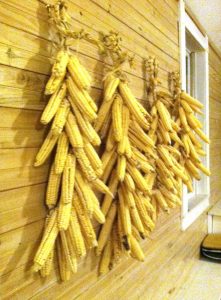 Long Ago Onondagas had developed their own food system to survive. The Haudenosaunee were hunters as well as gatherers. The crops that were the basis for our diet were corn, beans and squash. Corn, beans and squash are commonly referred to by the Onondaga as well as all of the Haudenosaunee as the 3 sisters. These foods were the three foods first given to us from our mother earth. The corn can be dried to then made into soup, ground into flour to make a “mush” and boiled to make a bread. The corn, beans and squash are so special to the community; they were given songs that are song to give thanks that they are still doing their duty and providing for us.
Long Ago Onondagas had developed their own food system to survive. The Haudenosaunee were hunters as well as gatherers. The crops that were the basis for our diet were corn, beans and squash. Corn, beans and squash are commonly referred to by the Onondaga as well as all of the Haudenosaunee as the 3 sisters. These foods were the three foods first given to us from our mother earth. The corn can be dried to then made into soup, ground into flour to make a “mush” and boiled to make a bread. The corn, beans and squash are so special to the community; they were given songs that are song to give thanks that they are still doing their duty and providing for us.
The Onondagas live in the beautiful finger lakes area of present day New York. That allowed the Onondagas for the spring and summer months to fish in the abundant streams. The fall and winter allowed for the hunting of deer, turkey, rabbit and game found throughout the area. When hunters brought down a large game such as a deer, the hunters would take what they needed and distribute the rest to members of the community. This tradition still continues as elders often are very excited and thankful when hunters return from a prosperous hunt. Our hunters are also taught to take only what is needed. The animals and the people live together on mother earth and it is important that everyone remains healthy to continue with their duties.
The springtime also brought life sustaining foods to the Onondagas. The earliest of these are the wild onions, the dandelions, the leak, and the milkweed. These foods are sought after in the fields and the woods for their green deliciousness. As spring turns to summer, the people again move to the fields this time in search of berries. Strawberries are considered to be special to the Creator as he grew them so close to mother earth that we give thanks to them also for continuing their duties. the Onondaga word for strawberries is “ohanda dehkahwhi”, which translates to “field of fire.”
Like the hunters, gatherers are also taught to take only what is needed. it is a lesson to learn not to deplete all of your resources and leave none for the people who are following you tomorrow, or to save for your grandchildren of the people not yet born.
